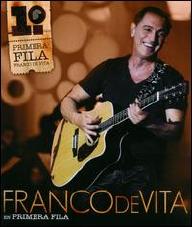Born on January 23, 1954 in Caracas, Venezuela, to parents of Italian heritage, he began his recording career as the lead vocalist, keyboardist, and songwriter of the trio Icaro. Comprised also of José Flores (bass) and Javier Exposito (drums), the trio released only one album, Icaro (1983), before De Vita embarked on a solo career. In association with the label Sonográfica, he made his full-length album debut a year later with Franco de Vita (1984), followed by Fantasía (1986). While these first two albums spawned numerous hit singles, De Vita's success was more or less confined to Venezuela until "Solo Importas Tu." The theme song to La Dama de Rosa, an internationally popular telenovela that aired in 1986-1987, "Solo Importas Tu" was De Vita's breakout hit, breaking into the Top Ten of the U.S. Latin singles chart, for instance, and driving the sales of his concurrent album Fantasía, as well. In the wake of this breakout success, De Vita signed a major-label recording contract with Sony Music and released the album Al Norte del Sur to widespread commercial success and critical acclaim. The album spawned a couple more international smash hits, "Te Amo" and "Louis," both of which were Top Ten hits on the U.S. Latin singles chart. The follow-up album, Extranjero (1990), was even more successful, spawning the chart-topping smash hit "No Basta." Subsequent albums, including Voces a Mi Alrededor (1993), Fuera de Éste Mundo (1996), and Nada Es Igual (1999), proved less popular but successful nonetheless, spawning a steady stream of hit singles.
After the turn of the century, De Vita continued to release albums at a steady rate, and among these latter-day releases, Stop (2004) proved especially successful due to the hit singles "Tú De Qué Vas" and "Si La Ves," the latter in collaboration with Sin Bandera. The following year, a deluxe edition of the album was issued as Stop + Algo Más. It included bonus tracks and duet versions of several album cuts with Olga Tañón, Brad Lee, and Reyli Jeremías, and a DVD. Riding the chart success of Stop, Mil y Una Historias en Vivo, a live album and concert video, followed in 2006. ?De Vita didn't release a new studio offering until 2008's Simplemente La Verdad, a collection of original songs that garnered him a Latin Grammy for Best Singer-Songwriter Album. De Vita toured in support.
In 2011, Sony launched the Primera Fila (Front Row) series of acoustic recordings. They chose top-tiered artists and showcased her/his arc in an intimate live setting with special guests in audio and video packages. The first of these was De Vita's En Primera Fila. It hit number one in ten countries, went platinum in Mexico, and was certified Gold in the U.S. Its two singles, "Tan Sólo Tú" (a duet with Alejandra Guzmán), and "Mira Más Allá" also topped the charts and helped ensure the artist two Latin Grammys in the Best Male Pop Vocal Album and Best Long Form Music Video categories. He toured behind the album for the next year-and-a-half. Later in 2012, he guested on Tony Bennett's Viva Duets on "The Good Life." Sony did the unprecedented when they asked De Vita for a follow-up volume. Vuelva en Primera Fila was issued in 2013. Even grander in scope, it featured an international roster of guest artists and its lead single, "Te Pienso Sin Querer," a duet with Gloria Trevi, went to number one. The album topped the Venezuelan Top 40 (where it went triple platinum) and landed at number six on the U.S. Top Latin Albums charts. It was certified Gold Mexico. The video portion, titled #Cronicas, was directed by award-winner Juan Asuage. The release was followed by an 18 country tour.
On August 12, 2016, De Vita released the single "¿Dónde Está La Vida?" his first new studio composition in seven years. He followed it with the album Libre in October. Guests artists included Spanish singer Rosario on "Desde el Principio" and Banda La Trakalosa De Monterrey on "Ya No Te Creo." ~ Jason Birchmeier, Rovi
|
1
|
|
Tú de Qué Vas |
|
2
|
|
Te Amo |
|
3
|
|
Tan Sólo Tú |


















